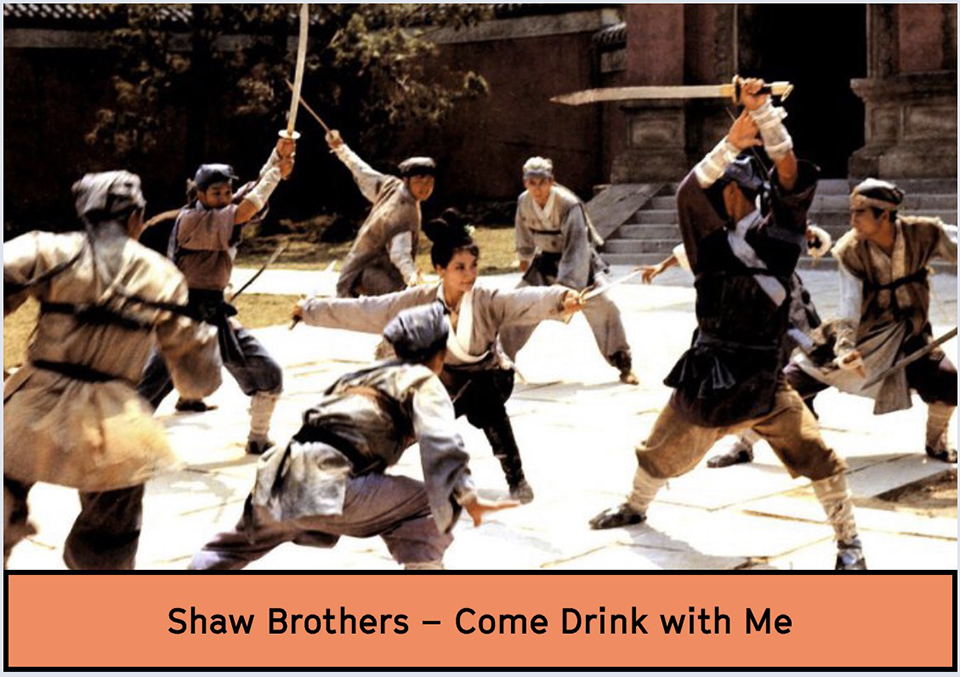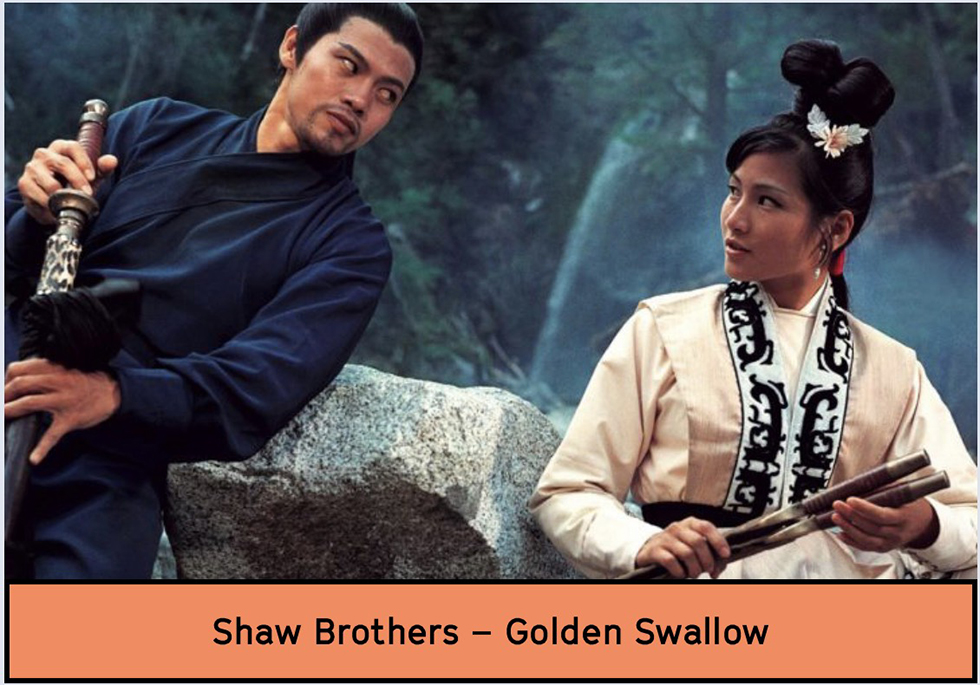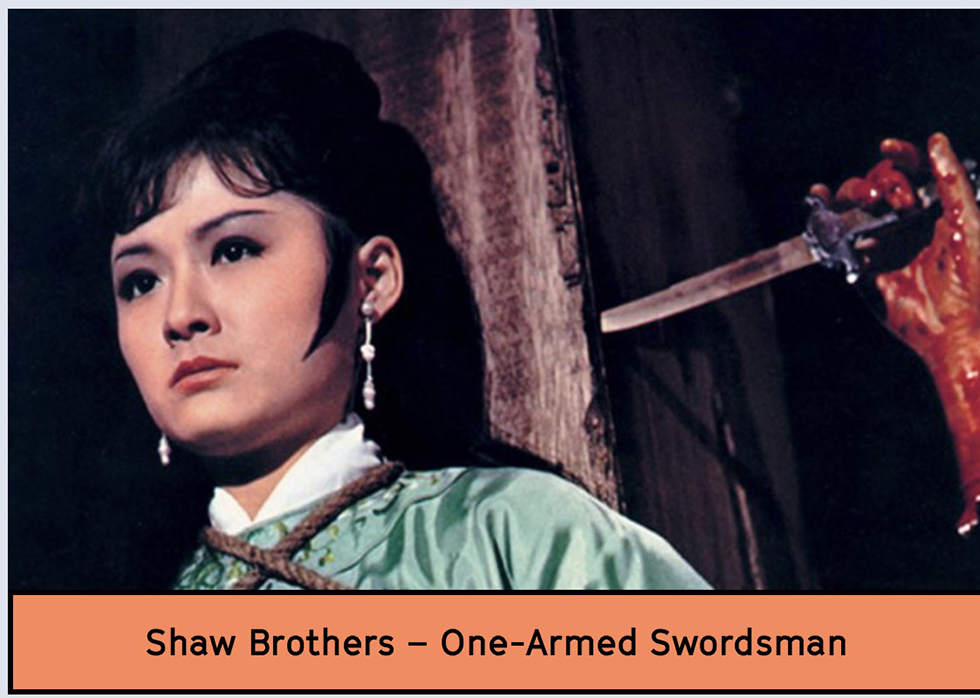By Andrew Hamlin
NORTHWEST ASIAN WEEKLY
They prospered through most of the 20th century and into the 21st. They left their marks in theater, television, and philanthropy, but they’re best known for their films, which turned Chinese cinema, Hong Kong cinema, and eventually, world cinema, on its ear, creating standards and techniques still resonating after their deaths.
The four movie-producing brothers named Shaw (Runje, Runme, Runde, and Run Run) were “essentially responsible for the creation of the kung-fu genre,” said Morgan Akana at Northwest Film Forum. Akana, co-programmer of a four-film Shaw Brothers Studio retrospective, allowed that such martial arts films are “in no way indicative of the entirety of Chinese cinema. But [the Shaws] managed to bring the East to the West guns blazing.”
The Shaws combined quantity with quality, and by the late 1950s, the studio turned out 40 titles per year, averaging a new one every nine days. Picking only four to represent the entire output wasn’t easy, Akana said, but she leaned, along with her co-programmers Paul Siple and Amanda Salazar, towards portrayals of strong women.
“We wanted an exhibition of rugged and complex female fortitude,” she explained. “These films are also prototypical of the exceptionally elegant cinematography and the painterly set design you come to expect of the company. There’s a good level of seriousness towards their material in our choices, which then allows a decent bushwhacking when the camp elements show up.”

The series leads off on Dec. 19 with “Confessions of a Chinese Courtesan,” from 1972, directed by Chor Yuen. That stars Lily Ho as a young lady abducted and forced into prostitution at the hands of a sadistic brothel keeper played by Betty Pei Ti.
Akana described “Courtesan” as “not erotic,” despite being marketed around the world as a softcore porn film. “The relationships are complex and the visuals are lush and visceral and grotesque and rhythmic,” she elaborated.

Jan. 9 brings 1966’s “Come Drink with Me,” directed by King Hu, a pioneer and innovator in the “wuxia” (historical Chinese martial arts) genre, who became almost as famous as the Shaws themselves. This stars Chan Hung-lit as the vicious leader of a bandit gang, convinced his men can’t possibly lose.
To his surprise, the biggest foe of the bandits turns out to be a woman, Cheng Pei-pei, playing a general’s daughter known as “Golden Swallow.”

“Golden Swallow” itself forms the title of Jan. 16’s title, from 1968, and directed by Chang Cheh. Nominally a sequel to “Come Drink with Me,” it does indeed bring back Cheng Pei-pei, but installs her in a bloodier, wandering adventure revolving around a good old-fashioned love triangle, bolstered by a shaky camera, impressive outdoor photography, and an aggressive body count.

Chang Cheh also helms the last film in this series, “The One-Armed Swordsman,” released in 1967. This one follows a young man, born into a family of servants, as he loses one arm, but does everything he needs to with his remaining arm, eventually becoming one of the most famous fighters of his age. This was the first Shaw Brothers film to gross over $1 million in Hong Kong dollars. It also made an instant superstar out of the young man in the lead role, Jimmy Wang Yu, who’d work many times more for the Shaws, fighting with swords, fists, and anything else handy.
Akana hopes that these restored prints will help viewers see the Shaw’s work as highly informed works of art, rather than simple action entertainment.
“The big takeaway is that these movies aren’t merely confection, they’re a full course meals,” she concluded. They have an admirably unique set of priorities to the production when you watch them—so much attention to choreography, environment, such high drama! The over-the-topness of everything that happens in them is an unmatched delight.”
The Shaw Brothers Studio retrospective plays over four nights, between Dec. 19 to Jan. 23, 2019 at the Northwest Film Forum. For prices, showtimes, and other information, visit nwfilmforum.org/series/shaw-brothers-kung-fu-wuxia.
Andrew can be reached at info@nwasianweekly.com.



